Disagreement Letter To Employer
[Your Name]
[Your Address]
[City, State, Zip Code]
[Email Address]
[Phone Number]
[Today's Date]
[Employer's Name]
[Company Name]
[Company Address]
[City, State, Zip Code]
Subject: Disagreement with [Specific Issue]
Dear [Employer's Name],
I hope this letter finds you well. I am writing to express my disagreement with [specific issue or situation]. It is essential for me to address this matter respectfully and professionally, as open communication is vital in maintaining a healthy work environment and promoting mutual understanding.
I want to emphasize that my intention in writing this letter is not to cause any disruption or conflict but to ensure that my perspective is heard and considered. I believe that addressing concerns openly and constructively can lead to finding solutions that benefit both the company and its employees.
[Explain the specific issue in detail, providing relevant facts and evidence to support your position. Be clear and concise, focusing on the main points.]
Despite my disagreement, I am committed to maintaining a positive working relationship with the company and my colleagues. I am open to discussing this matter further with you or any relevant party to explore potential solutions that align with the company's objectives and values.
I sincerely request an opportunity to meet with you or the appropriate person to discuss this matter further. Please suggest a time and date that would be convenient for you, and I will make every effort to accommodate the meeting.
I value the experiences and opportunities I have had while working at [Company Name], and I believe that open dialogue can lead to a more productive and harmonious workplace. I remain dedicated to contributing my best efforts to the success of the company.
Thank you for taking the time to consider my perspective. I look forward to resolving this matter amicably.
Sincerely,
[Your Name]
Formal Letter Disagreeing with Employer’s Decision
Subject: Respectful Disagreement Regarding Recent Decision
Dear [Manager’s Name],
I am writing to formally express my disagreement with the recent decision concerning [specific issue, e.g., project allocation, performance review, policy change]. While I understand the reasoning behind this decision, I believe it may not fully consider certain aspects that significantly affect my work and our team’s overall performance.
Specifically, [explain your point of disagreement with supporting details, evidence, or examples]. From my perspective, a different approach could lead to a more productive outcome and align better with the goals of our department.
I deeply value our professional relationship and remain committed to my responsibilities. My intention is not to challenge authority but to highlight potential impacts that may have been overlooked. I kindly request that we review this matter again and consider alternative options.
Thank you for taking the time to listen to my concerns. I look forward to discussing this with you further.
Sincerely,
[Your Name]
Casual Email Disagreeing with Work Assignment
Subject: Thoughts on the Recent Assignment
Hi [Manager’s Name],
I wanted to share my thoughts about the new assignment I’ve been given. While I appreciate the trust placed in me, I feel the role might not align with my strengths and could potentially limit my contribution to the team’s success.
I believe I could add more value if I continue working on [specific project/task], where I’ve already built expertise and momentum. Would it be possible to reconsider this distribution so the team benefits the most from everyone’s skills?
Thanks for your understanding and for always being open to feedback. I’m happy to talk this over whenever it’s convenient.
Best,
[Your Name]
Strongly Worded Letter Disagreeing with Policy Change
Subject: Concerns Regarding New Policy Implementation
Dear [Manager’s Name],
I am compelled to express my strong disagreement with the newly introduced policy regarding [state the policy]. While policies are essential for order, this particular change could have unintended negative consequences for employee morale and productivity.
My concern is that [explain in detail the risks, citing examples, research, or team feedback]. Such measures may also create a sense of unfairness among employees, which could harm our workplace culture.
I urge leadership to reconsider or at least open a discussion with staff before fully enforcing this change. A collaborative approach could yield a policy that balances company goals with employee well-being.
I respect the need for policies, but fairness and dialogue must guide such decisions. I kindly request an opportunity to discuss this further.
Sincerely,
[Your Name]
Polite Letter Disagreeing with Performance Review
Subject: Feedback on Performance Review Results
Dear [Manager’s Name],
I am writing to respectfully share my perspective on the recent performance evaluation I received. While I appreciate the feedback provided, I believe some points may not accurately reflect my efforts and achievements over the review period.
For instance, [provide specific example where review differed from your records or contributions]. I would be grateful if these points could be reconsidered in light of the evidence I’ve attached.
I remain committed to self-improvement and professional growth, and I welcome constructive feedback. However, I also believe it is important for evaluations to be fair and balanced.
Thank you for taking my concerns into account. I hope we can discuss this in detail soon.
Kind regards,
[Your Name]
Quick Message Disagreeing with Schedule Change
Subject: Scheduling Adjustment Concern
Hi [Manager’s Name],
I noticed the new work schedule and wanted to share that I might face difficulties with the changes due to [brief reason]. I believe keeping my previous schedule, or at least adjusting slightly, would help me maintain both my productivity and work-life balance.
Could we look into a possible adjustment? Thanks for your understanding.
Best regards,
[Your Name]
Heartfelt Letter About Ethical Disagreement
Subject: Ethical Concerns with Assigned Task
Dear [Manager’s Name],
I write this letter with deep respect and concern regarding the recent assignment involving [describe task]. After much reflection, I must respectfully express that I am uncomfortable carrying out this task as I believe it conflicts with my personal ethics and professional values.
This is not a decision I make lightly, as I am fully dedicated to my role and to the organization. However, acting against my values would compromise both my integrity and my effectiveness at work.
I kindly request an opportunity to discuss an alternative arrangement. I hope to continue contributing positively to the team in a way that aligns with both organizational goals and ethical standards.
Thank you for your understanding and consideration.
Sincerely,
[Your Name]
Professional Email Disagreeing with Compensation Decision
Subject: Request for Reconsideration of Compensation Decision
Dear [Manager’s Name],
Thank you for informing me about the recent decision concerning my compensation. While I value the recognition given, I would like to respectfully express my disagreement with the outcome, as I believe it does not fully reflect my contributions and responsibilities over the past year.
During this period, I have [list specific achievements, milestones, or responsibilities], which have directly contributed to the company’s growth. Based on industry benchmarks and my performance, I feel a reconsideration of my compensation is warranted.
I remain committed to the organization’s success and appreciate the opportunity to discuss this matter further at your convenience.
Sincerely,
[Your Name]
Simple Message Disagreeing with Workplace Decision
Subject: Disagreement with Recent Decision
Hello [Manager’s Name],
I wanted to let you know that I respectfully disagree with the recent decision regarding [specific issue]. I believe there may be alternative ways to handle the matter that could be more effective.
Please let me know if we can set up a time to talk about it further. Thank you for considering my perspective.
Best,
[Your Name]
Diplomatic Letter Disagreeing with Transfer or Relocation
Subject: Request for Reconsideration of Transfer
Dear [Manager’s Name],
I recently received notice of my transfer to [location/department], and I wish to respectfully express my concerns. While I understand the organizational reasons, this change poses significant challenges for me, including [list personal or professional challenges].
I am committed to supporting company objectives, but I believe there are other ways I can add value without requiring relocation. For example, I could [suggest alternatives or compromises].
I respectfully request a reconsideration of this decision and would appreciate the chance to discuss this further.
Sincerely,
[Your Name]
What is a disagreement letter to an employer and why is it important?
A disagreement letter to an employer is a written communication where an employee respectfully expresses disagreement with a decision, evaluation, or policy. The purpose is not to oppose authority but to highlight concerns, provide alternative viewpoints, and ensure fair treatment. Writing such a letter helps maintain professionalism while voicing issues clearly, preventing misunderstandings that could harm workplace relationships.
Who should send a disagreement letter to an employer?
- Any employee who feels a decision or policy affects them unfairly.
- Staff members who believe their contributions were misrepresented in performance reviews.
- Workers who are uncomfortable with ethical aspects of certain tasks.
- Employees impacted by scheduling, transfer, or compensation changes.
To whom should the letter be addressed?
- Direct supervisor or line manager in most cases.
- Human resources department if the matter involves company policy or workplace ethics.
- Higher management if the disagreement relates to leadership decisions and the direct manager cannot address them.
- In cases of dispute resolution, sometimes a neutral committee or ombudsman may be appropriate.
When should you send a disagreement letter to your employer?
- After receiving a performance review you feel is inaccurate.
- When you are assigned duties conflicting with your expertise or ethics.
- Upon being notified of transfer, relocation, or scheduling changes you cannot accommodate.
- After learning about a new workplace policy that may have negative effects.
- When compensation, promotion, or recognition decisions seem unfair.
How do you write and send a disagreement letter?
- Begin with a respectful greeting and clear subject line.
- State the issue or decision you disagree with.
- Provide specific reasons, examples, or evidence supporting your view.
- Suggest alternative solutions or compromises if possible.
- Maintain a polite and professional tone throughout.
- Decide on the mode of delivery — email for quick issues, printed letters for formal disagreements.
- Keep a copy for your personal records.
Requirements and prerequisites before writing the letter
- Review the decision or policy carefully to avoid misunderstandings.
- Collect supporting documents, data, or evidence to strengthen your case.
- Clarify your main points to ensure your message is concise.
- Confirm the correct recipient (manager, HR, or senior leadership).
- Prepare emotionally before writing to avoid sounding confrontational.
Formatting guidelines for a disagreement letter
- Length: Usually one page or a few short paragraphs.
- Tone: Respectful, professional, and constructive.
- Structure: Introduction, body with details, conclusion with request for reconsideration.
- Style: Formal for printed letters, slightly casual for emails.
- Mode of sending: Email for most work issues; official letter for sensitive or documented concerns.
- Etiquette: Avoid accusatory language, focus on facts and solutions.
What to do after sending the letter
- Wait for acknowledgment or response from your employer.
- Be prepared for a follow-up meeting or discussion.
- Stay professional even if your disagreement is not accepted.
- If unresolved, consider escalation through HR or workplace grievance channels.
- Document all communications for future reference.
Pros and cons of sending a disagreement letter
Pros:
- Allows you to voice concerns formally.
- Creates a written record of your perspective.
- May influence reconsideration or positive change.
Cons:
- Risk of being perceived as confrontational if tone is poor.
- May not always lead to desired outcomes.
- Could strain relationships if not handled diplomatically.
Common mistakes to avoid in disagreement letters
- Writing in anger without reviewing carefully.
- Using disrespectful or accusatory language.
- Being too vague without evidence or details.
- Making the letter excessively long and unfocused.
- Failing to suggest solutions or alternatives.
Elements and structure of a disagreement letter
- Subject line or heading: Clearly states disagreement.
- Introduction: Polite opening and reason for writing.
- Body: Details of the disagreement with supporting points.
- Alternative solutions: Suggestions or requests for reconsideration.
- Conclusion: Respectful closing with hope for further discussion.
- Attachments: Supporting documents if applicable.
Tips and best practices for writing disagreement letters
- Keep emotions in check — be calm and factual.
- Use "I" statements instead of "you" to avoid blame.
- Back your disagreement with evidence.
- Offer compromises or alternatives instead of only pointing out problems.
- Re-read your letter before sending to ensure tone is professional.
Comparing disagreement letters with other workplace communication
- Disagreement letter vs. Complaint letter: A disagreement letter is more professional and constructive, while a complaint letter is more about dissatisfaction.
- Disagreement letter vs. Resignation letter: A disagreement letter seeks resolution; a resignation letter ends the working relationship.
- Disagreement letter vs. Verbal discussion: Verbal talks are faster but leave no record, while letters provide formal documentation.
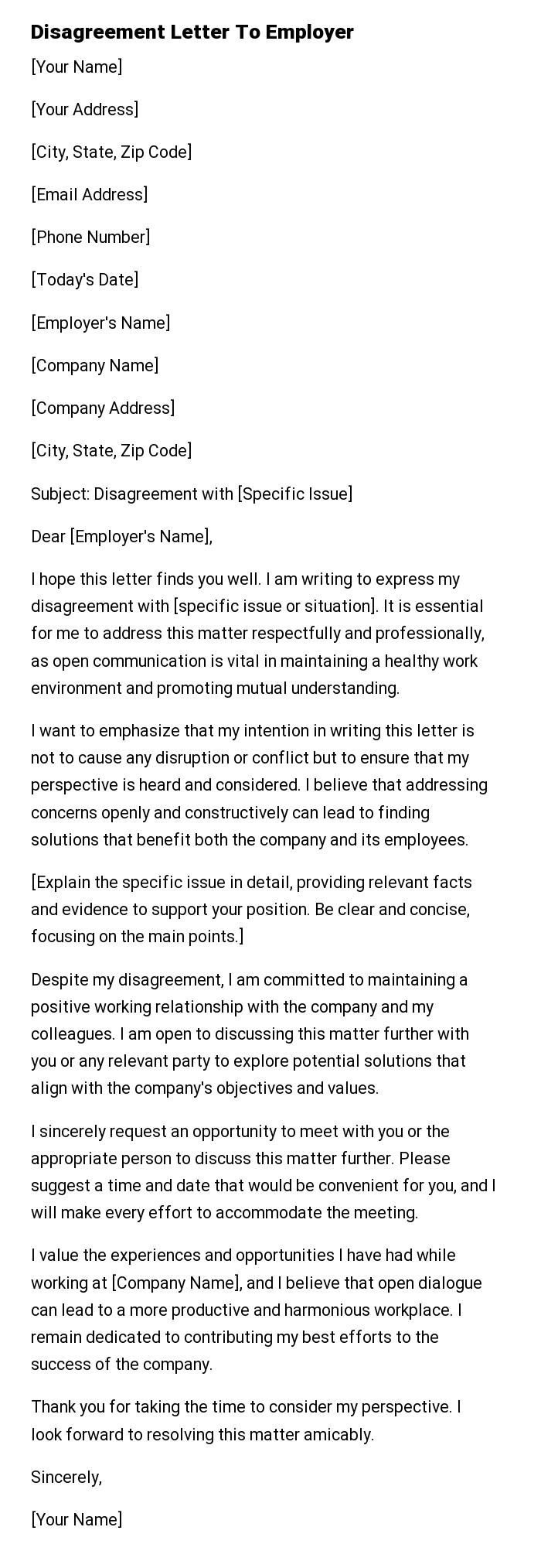
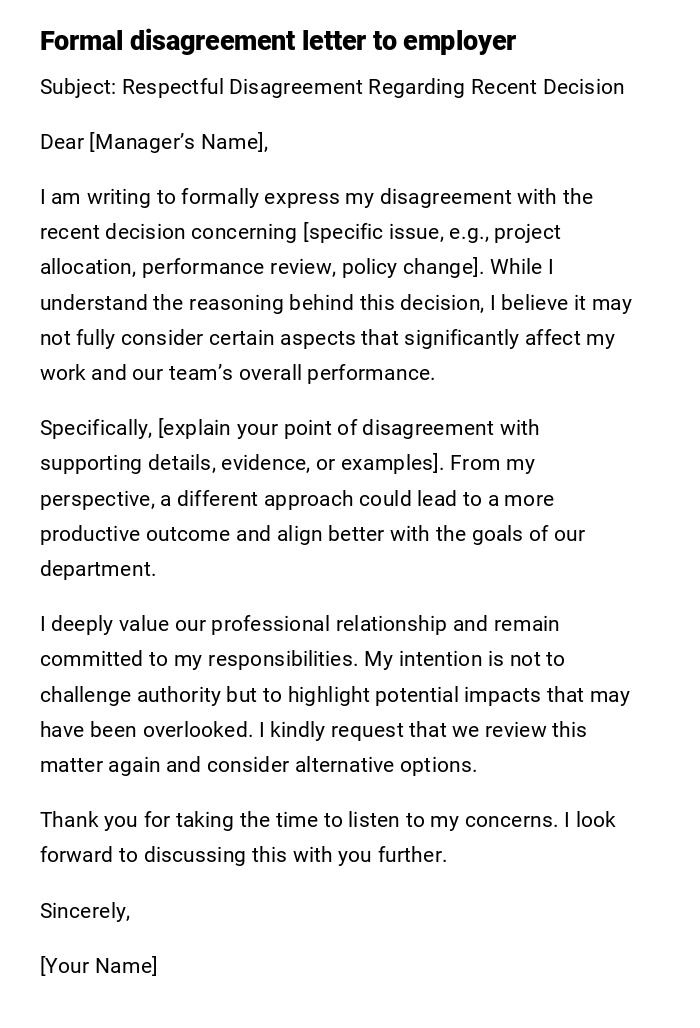
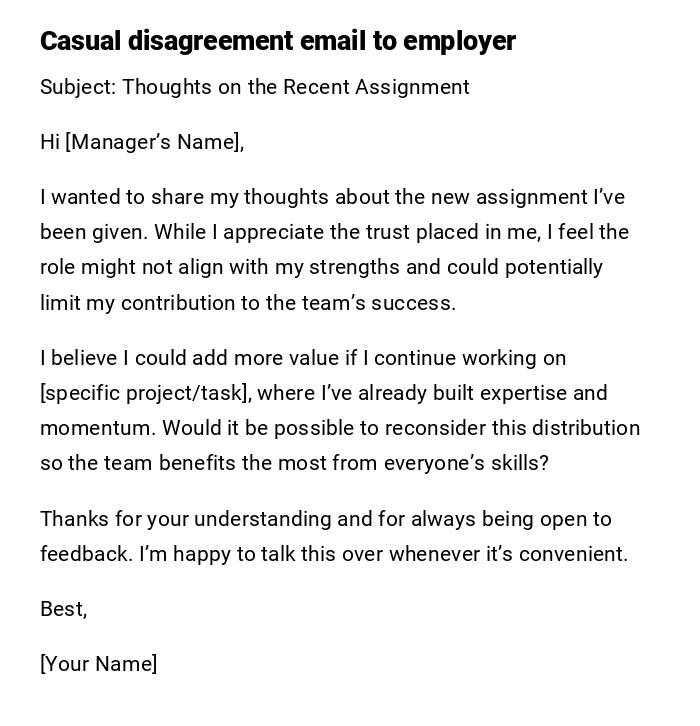
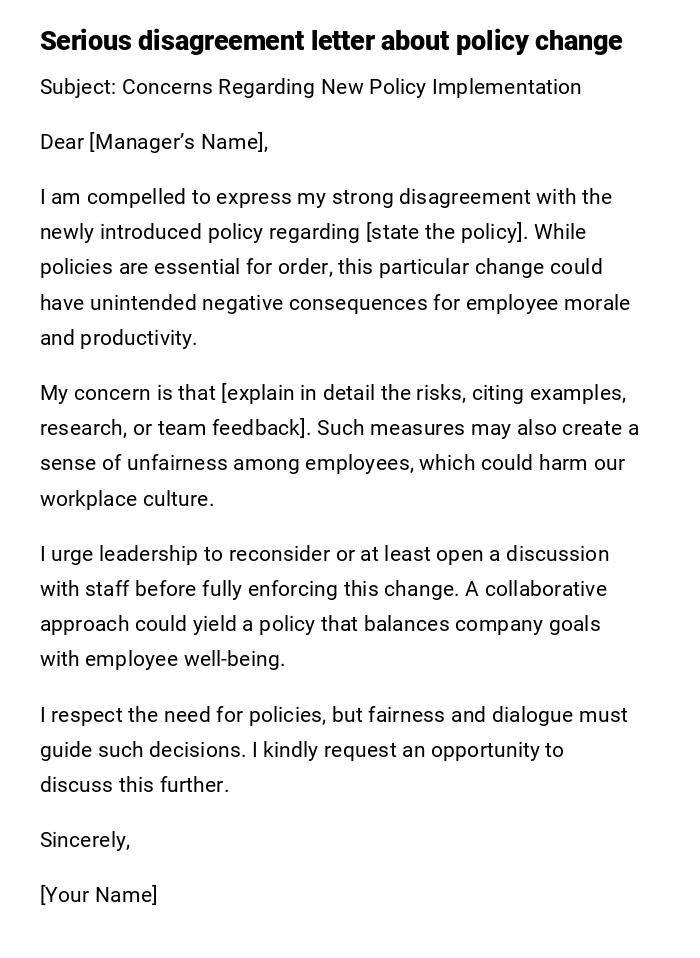
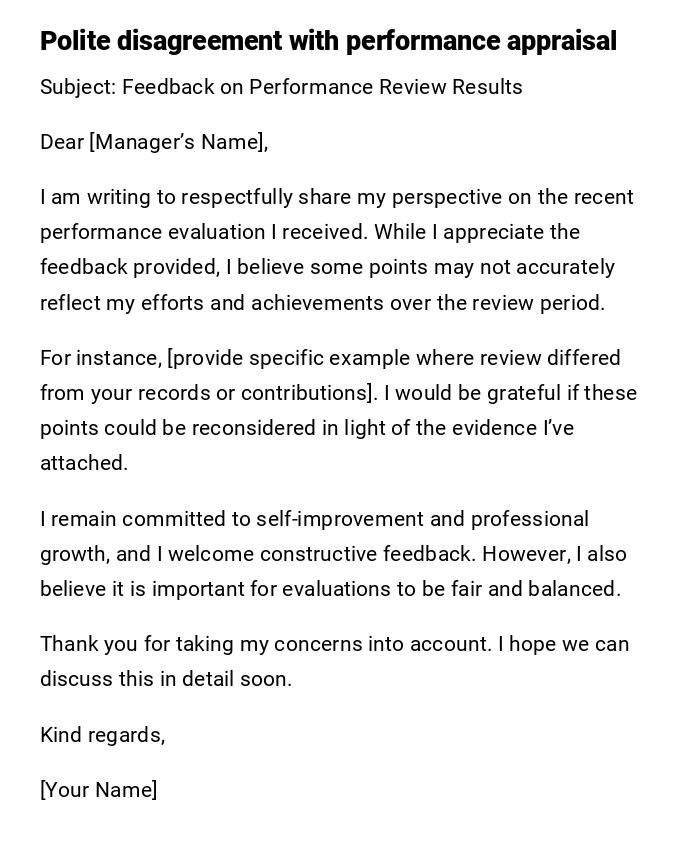
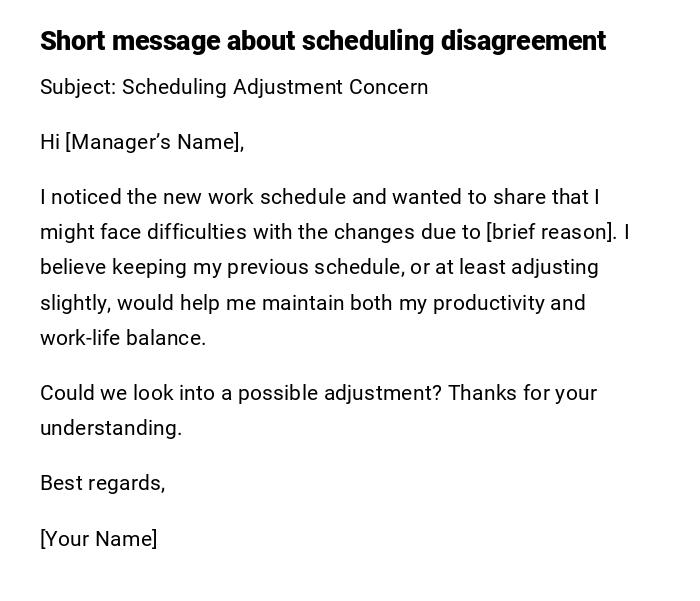
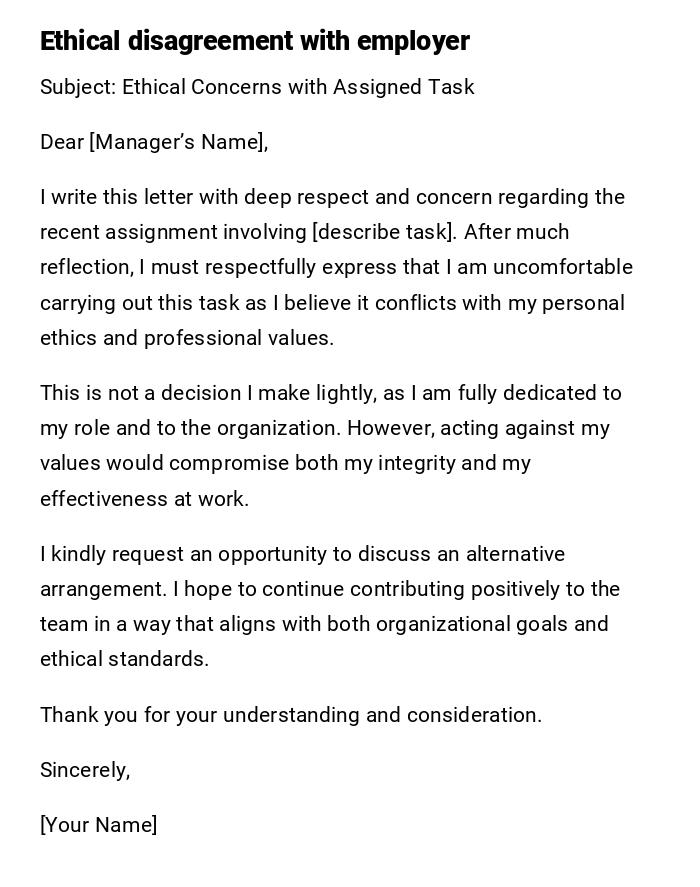
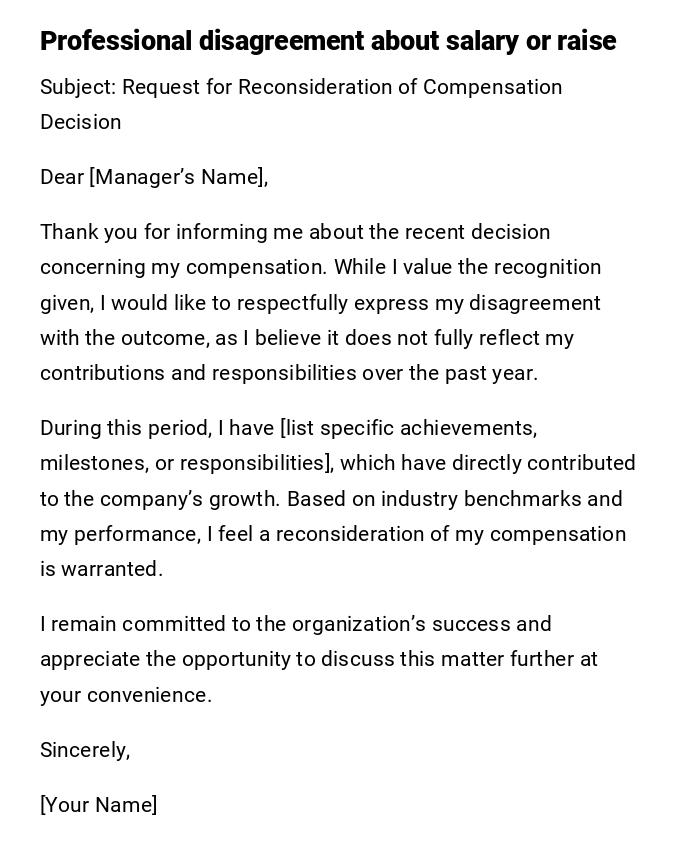
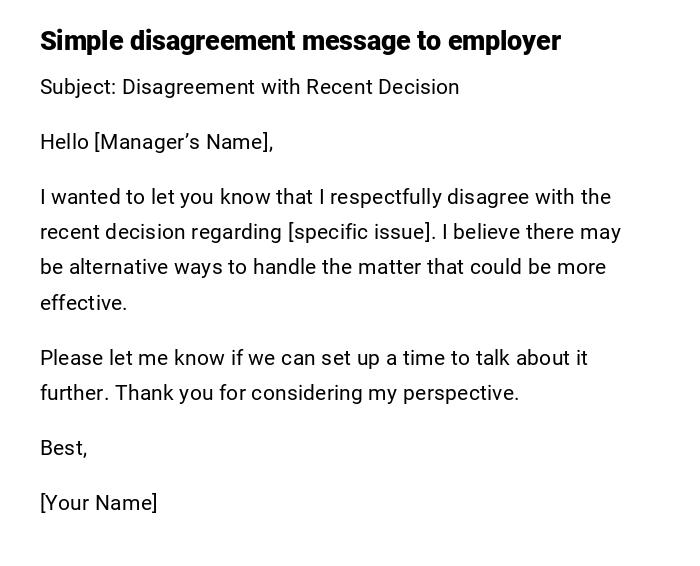
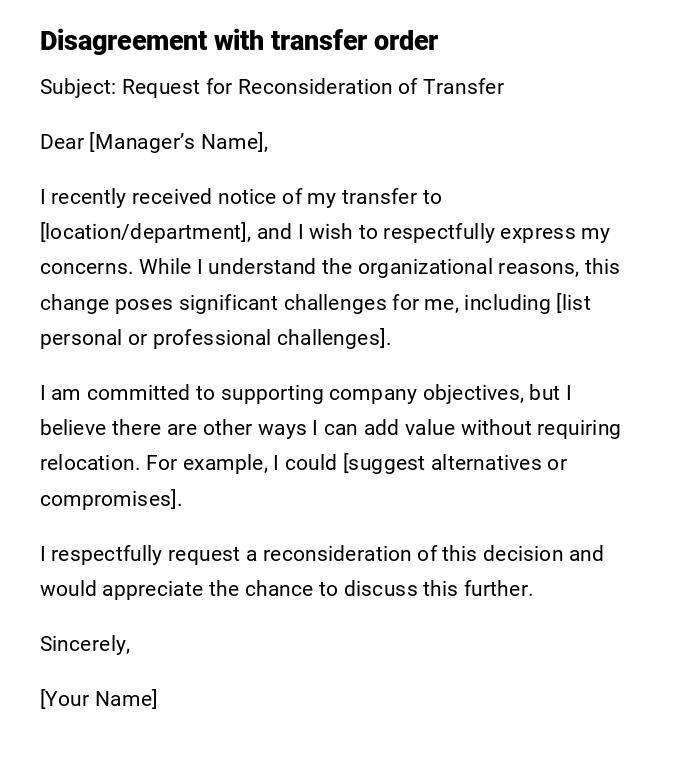

 Download Word Doc
Download Word Doc
 Download PDF
Download PDF